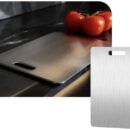
The Role of Custom Bread Bakery Bags in Health and Safety: Ensuring Hygienic Packaging for Fresh Baked Goods
In the food industry, health and safety are paramount. For bakeries, ensuring the freshness and hygiene of baked goods is not only a matter of regulatory compliance but also a critical factor in maintaining customer trust and satisfaction. Custom bread bakery bags play a vital role in this process, offering a tailored solution that protects products, enhances branding, and meets the highest standards of hygiene.
This article explores the importance of custom bread bakery bags in promoting health and safety, and how they contribute to ensuring the hygienic packaging of fresh baked goods.
1. Protecting Against Contaminants
Freshly baked goods are particularly vulnerable to contamination due to their moisture content and lack of preservatives. Custom bread bakery bags provide an essential layer of protection against dust, dirt, and other environmental contaminants that may compromise the quality and safety of the product.
Custom bags can be designed with food-safe materials that create a barrier against external elements while maintaining the bread’s freshness. For example, grease-resistant or laminated paper bags prevent oils and moisture from leaking, keeping the product clean and protected. This ensures that the bread reaches the customer in pristine condition, free from harmful substances.
2. Maintaining Hygiene Standards
In today’s health-conscious market, consumers expect food packaging to meet stringent hygiene standards. Custom bread bakery bags made from FDA-approved, food-grade materials ensure compliance with these regulations, giving both bakeries and customers peace of mind.
Additionally, single-use custom bags are particularly effective in preventing cross-contamination. Each loaf or batch of bread is individually packaged, reducing the risk of contact with external surfaces or other products. This is especially important for bakeries offering allergen-free or specialty bread, where cross-contamination could pose serious health risks.
3. Preserving Freshness and Quality
Custom bakery bags are not only about hygiene; they also play a crucial role in preserving the freshness and quality of baked goods. Bags with moisture-control features, such as breathable paper or perforations, help regulate humidity levels. This prevents the bread from becoming soggy or overly dry, ensuring that customers enjoy the same freshness and texture as when the bread was baked.
For artisan or specialty bread, custom bags can be tailored to accommodate unique requirements, such as maintaining crust texture or preserving delicate flavors. By extending the shelf life of baked goods, these bags also help reduce food waste, aligning with broader sustainability goals.
4. Enhancing Safety Through Secure Packaging
Secure closures, such as adhesive seals, twist ties, or resealable zippers, further enhance the safety of custom bread bakery bags. These features ensure that the packaging remains intact during transport and storage, minimizing the risk of tampering or accidental exposure to contaminants.
Tamper-evident designs provide an additional layer of security, reassuring customers that the product has not been compromised. This is particularly important in today’s market, where consumers prioritize food safety and transparency.
5. Supporting Transparency and Customer Trust
Custom bread bakery bags also serve as a platform for communicating important health and safety information. Bakeries can print clear labels with details about the product, such as ingredients, allergens, and expiration dates. This transparency helps customers make informed choices, particularly those with dietary restrictions or allergies.
For example, bakeries that specialize in gluten-free, vegan, or organic bread can use custom packaging to highlight these attributes, fostering trust among health-conscious consumers. Including storage and handling instructions on the bag further emphasizes the bakery’s commitment to safety and customer satisfaction.
6. Adapting to Post-Pandemic Hygiene Expectations
The COVID-19 pandemic has heightened consumer awareness of hygiene, making protective packaging more important than ever. Custom bread bakery bags provide a hygienic solution that aligns with these expectations, ensuring that baked goods are packaged and delivered with the utmost care.
Bakeries can further reassure customers by incorporating health-focused messaging on their bags, such as “Hygienically Packed for Your Safety” or “Handled with Care.” This not only addresses customer concerns but also enhances the bakery’s reputation for prioritizing health and safety.
7. Sustainability and Hygiene: Striking the Right Balance
While hygiene is a top priority, bakeries are also under pressure to adopt sustainable practices. Custom bread bakery bags made from recyclable, compostable, or biodegradable materials strike the perfect balance between health, safety, and environmental responsibility.
Eco-friendly packaging options, such as paper bags with water-based inks or reusable cloth bags, allow bakeries to meet hygiene standards while reducing their environmental footprint. Highlighting these sustainable practices on the packaging further appeals to environmentally conscious customers.
Conclusion
Custom bread bakery bags play a critical role in ensuring the health and safety of fresh baked goods. From protecting against contaminants and maintaining hygiene standards to preserving freshness and supporting transparency, these bags are an indispensable part of modern bakery operations.
By investing in high-quality, tailored packaging solutions, bakeries can meet customer expectations for safe, hygienic, and sustainable products. In doing so, they not only enhance the dining experience but also build trust and loyalty among their customers, setting themselves apart in a competitive market.












